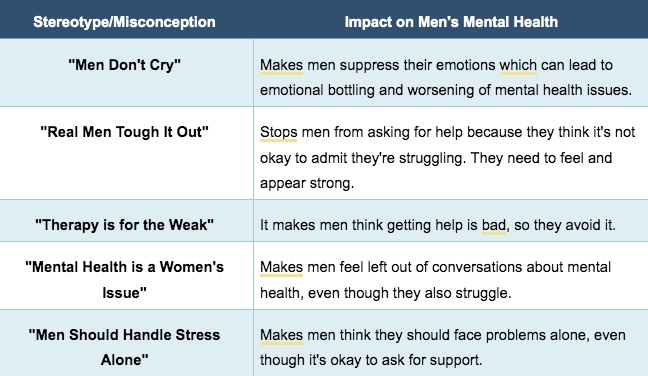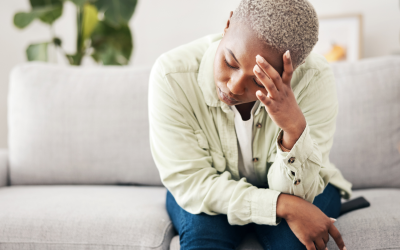
Men’s Mental Health – More Than Just the ‘Man Up’ Narrative
Written By: Tooba Tahir, Founder of BloomingGuide
Forget the heavy lifting for a moment; we’re talking about mental deadlifts. It’s time to recognize that our minds need a workout, too.
After all, being alpha isn’t just about physical dominance; it’s about dominating your mental game.
Neglecting mental well-being is like skipping leg day – it may seem fine at first, but trust me, it catches up with you.
Get ready, because we’re diving into the conversation where real strength isn’t just about lifting. It’s about facing what’s hidden. It’s about men’s mental health.
Current Stats on Mental Health Issues Among Men:
According to Mental Health America:
- Despite making up about 10% of patients with bulimia or anorexia, men grappling with an eating disorder are less likely to seek professional help.
- Over 6 million men battle depression each year, yet male depression frequently goes undiagnosed.
In addition, an article published by the Mental Health Foundation noted that:
- Three times as many men than women are likely to die by suicide.
- Men aged 40 to 49 have the highest suicide rates in the UK.
These statistics aren’t just numbers; they represent real people, real mental health conditions, and a real mental health crisis.
The Stigma Surrounding Men’s Mental Health
In our society, there’s a big secret hiding in the way we think about men’s feelings and mental health. Imagine a world where it’s not easy for men to say, “Hey, I’m not feeling okay.”
This is because of something we call a stigma, a kind of invisible wall that makes it hard for men in your life to talk about their feelings. This stigma around men’s mental health is the biggest barrier to being vulnerable.
Common Stereotypes and Misconceptions about Men’s Mental Health

The Need To Talk About Their Mental Health: Unique Challenges Faced by Men
Men, like everyone else, live in a world shaped by expectations. Society often paints a picture of what a “real man” should be—strong, independent, and unyielding.
The pressure to conform to these ideals can lead to stress, anxiety, and many other mental health problems.
Specific Mental Health Concerns Disproportionately Affecting Men:
- Suicide Rates – Men are more likely to die by suicide than women, as the data above suggests. It’s one of the leading causes of death among men and boys.
- Substance Abuse – Men are more likely to turn to substances like alcohol and drugs as a coping mechanism, influenced by societal norms that discourage open emotional expression.
- Workplace Stress – The pressure to excel in careers and fulfill the provider role can contribute to heightened stress levels, impacting mental health.
- Isolation – The idea that men should be self-sufficient can contribute to social isolation, depriving them of crucial support networks, and leading to mental health difficulties.
Mental Health Care – Barriers To Accessing Better Mental Health Support
1. Stigma and Stereotypes
The stigma surrounding mental health, coupled with societal stereotypes that discourage emotional expression, can create a significant barrier.
Men may fear judgment or perceive seeking help as a sign of weakness.
2. Traditional Gender Expectations
The general expectation is that men should be strong, self-sufficient, and able to handle problems independently. This expectation clashes with the idea that vulnerability is a strength.
As a result, men are less likely to seek support from a healthcare provider because they see it as a weakness that, over time, may result in depression and thoughts of suicide.
3. Lack of Awareness
Limited knowledge about available mental health resources or a lack of awareness regarding the importance of seeking help may hinder men from taking the first step toward health and wellness.
4. Financial Barriers
The cost of mental health services and therapy sessions can be a significant obstacle for many individuals, preventing them from accessing the support they need to discuss their mental health signs and symptoms.
Getting Help: Prioritizing Men’s Mental Health Treatment
To break down the barriers as a society, here’s what can be done:
- Launching public health campaigns to educate communities about mental health and challenging stereotypes.
- Increased access to mental health care, including affordable therapy options, helplines, and crisis lifelines (call 911 or 988 easily), to ensure that seeking help is both feasible and financially viable. Ideally, these services should be available 24 hours a day.
In addition, below are some additional mental health tips that men should consider on an individual level:
- Recognize and acknowledge emotions without judgment. It’s okay not to be okay.
- Reach out to mental health professionals, therapists, or counselors.
- Build an emotional support network of friends, family, or peers.
- Learn ways to manage your emotions – dedicate time to activities that bring joy and relaxation, whether it’s exercise or simply taking a moment to breathe.
Conclusion – Breaking the Stigma
In challenging the norms that define resilient masculinity, it’s crucial to talk openly about mental health. Men may be less likely to discuss their mental health due to stigma, but it’s essential to recognize that seeking help is a sign of strength, not weakness.
Among males, risk factors for mental health difficulties may differ, but acknowledging signs of mental health issues and discussing them is an important step.
This Men’s Health Month, let’s be advocates for change. By promoting awareness, sharing health tips, and encouraging open conversations, we can reshape the narrative. The National Alliance on Mental Illness and Crisis Lifelines are available 24 hours a day for those in need.
Mental health conditions aren’t a joke.
Your mental health matters and, help is available 24/7 through hotlines like the National Suicide Prevention Lifeline.
About The Author: Tooba, the Founder of BloomingGuide, is an experienced educator, writer, and career counselor, holding a Bachelor’s degree in Psychology with a gold medal for academic excellence and is a Professional Member of ISSUP & Member of ANZMH. Passionate about mental health advocacy, she combines her expertise in personal growth and well-being to provide valuable insights in these areas.
To discuss how therapy could help you during this season of your life, please contact me or schedule your free 15 minute consultation.
Want to read more? Here are a few of my related blog posts you may be interested in checking out!
Check out some items we think you’ll love!




0 Comments